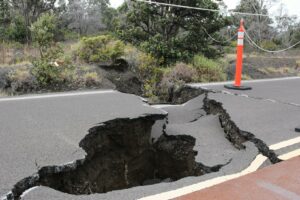Climate change, a hot topic in the 21st century, is often linked to a myriad of environmental issues. But can it also be a contributing factor to seismic activities? To the untrained eye, the connection between climate change and earthquakes may seem far-fetched, but recent studies suggest there might be more to it.
Understanding Earthquakes and Climate Change
In the wake of challenging prevailing perceptions, it’s pivotal to comprehend both seismic activities and climate change. This section delves into the definition and causes of earthquakes, and the main features of climate change.
 Definition and Causes of Earthquakes
Definition and Causes of Earthquakes
An earthquake manifests as a sudden shaking of the Earth’s crust. The primary cause lies in the movement of tectonic plates, the massive pieces of Earth’s lithosphere that fit together like a puzzle. When these plates move, they often get stuck at their edges due to friction. Pressure gradually builds until the crustal rocks rupture, releasing the accrued energy in the form of seismic waves.
These waves propagate through the Earth, producing the shaking experienced during an earthquake. One noteworthy instance is the 2011 Tohoku earthquake, measuring 9.0 on the Richter scale, triggered by a rupture in the tectonic plate boundary off the east coast of Japan.
Making Sense of Climate Change
Climate change refers to significant changes in global temperatures and weather patterns over time. Human activity, principally the burning of fossil fuels for energy, contributes notably to this change, leading to global warming—an increase in Earth’s average temperature. Examples include the rise of global temperatures by 0.9 degrees Celsius (1.6 degrees Fahrenheit) since the late 19th century and the reduction of the Arctic sea ice by 12.85% per decade since 1979.
Earth’s rising temperatures can in turn influence natural systems, altering precipitation patterns, causing sea levels to rise, and triggering more intense and frequent extreme weather events. These changes not only affect the climate and environment but also pose serious threats to human and ecological systems. It’s this complex interplay of factors and impacts that we refer to as climate change.
Does Climate Change Cause Earthquakes
A collection of studies provides insights into the intricate relationship between climate change and earthquakes. A detailed analysis of these relationships can further unlock the mysteries of our planet’s behavior.
Recent Studies and Research Findings 
Scientific research indicates a potential correlation between the events of climate change and the incidence of seismic activities. Numerous studies, like the work conducted by the University of Miami Nature in 2016, suggest that extreme weather phenomena, such as drought or heavy rainfall, could induce seismic activity. For instance, a comprehensive research project in Taiwan paired rainfall data with a catalog of 20,000 earthquakes. The findings underscored that heavy rainfall correlates with the uptick in seismic activities. However, these are preliminary findings, and more research is required to uncover the definitive links between the two phenomena.
Correlation Between Melting Glaciers and Earthquakes
Melting glaciers, another facet of climate change, also show a possible link with seismic activities. As glaciers melt due to rising global temperatures, vast amounts of pressure are released from the Earth’s crust. This phenomenon, known as glacial isostatic adjustment, may trigger earthquakes. An astounding example was seen in Greenland where the ice mass loss was linked to a spike in earthquakes. Like the connection between extreme weather and seismic activities, the glacial melting-earthquake relationship is still a subject of ongoing research. As more data becomes accessible, scientists continue to investigate this complex dynamic to further clarify its impact and implications.
Evaluating Human Activities
This section examines the role of human activities, particularly the emission of carbon dioxide and other greenhouse gases, in climate change and their potential influence on seismic processes.
 Impact of Carbon Footprint on Climate
Impact of Carbon Footprint on Climate
Human activities contribute significantly to climate change, primarily through the production and release of greenhouse gases. These activities range from automobile usage and industrial processes to deforestation and agriculture. Specifically, carbon dioxide, one of the most prevalent greenhouse gases, plays an instrumental role in climate change. The Global Carbon Project estimates that in 2019, the world released 36.8 billion tonnes of CO2. This increase in atmospheric CO2 levels, known as an expanded ‘carbon footprint,’ instigates global warming, marked by rapidly rising temperatures and increasingly erratic weather patterns.
Influence of Human Activities on Seismic Processes
There is growing evidence to suggest that human actions indirectly trigger seismic activities. For instance, scientific studies have shown that increased rainfall, driven by climate change, can lead to a heightened risk of landslides and consequentially, seismic activities. Likewise, glacial melting, expedited by global warming, alters the load pressure on tectonic plates and can potentially trigger seismic activities. Another relevant example is the induced seismicity associated with human activities like mining, dam impoundment, and hydraulic fracturing, also known as ‘fracking.’ These instances underscore the complex dynamics between human activities, climate change, and earthquakes, pointing to an urgent need for more in-depth research and understanding.
The link between climate change and earthquakes isn’t set in stone. It’s a complex relationship that requires more research and data. Yet, the potential correlation can’t be ignored.



